The article ''Met een klemmetje en een koptelefoon van het gekmakende oorsuizen af" (Getting rid of the maddening tinnitus with a clip and headphones) describes a novel approach to treating tinnitus, a condition where individuals hear noises that are not caused by an external source. Tinnitus can be extremely distressing, affecting approximately two million people in the Netherlands alone. The text explains that despite years of research, effective solutions for tinnitus are still elusive, prompting scientists to rethink their strategies.
Dirk de Ridder, a professor of neurosurgery at the University of Otago in New Zealand, and Wouter Serdijn, a professor of bio-electronics at TU Delft, have collaborated to develop a device intended to treat tinnitus through a new method. Their device, humorously referred to as 'De broodtrommel' (The lunchbox) during the interview but officially called the Delft Tinnitus Device, aims to teach the brain that the sound heard by tinnitus patients is not significant, hoping this realization will lead the brain to stop generating the sound.
The causes of tinnitus are varied, including exposure to loud music, ear infections, and aging. For some, tinnitus is merely annoying, but for others, it can severely impact sleep, work, and overall mental health, with some individuals becoming so desperate that they consider ending their lives.
The innovative approach taken by De Ridder and Serdijn focuses on stimulating the autonomic nervous system using electrical pulses applied to the tragus (a part of the outer ear) while simultaneously exposing the patient to tinnitus sound. This bimodal stimulation aims to condition the brain to perceive the tinnitus sound as unimportant, allowing it to be ignored.
Clinical trials for the Delft Tinnitus Device are set to begin in April in New Zealand. The treatment represents a significant shift from traditional methods that primarily focused on the auditory system to a more holistic view involving the brain's networks and the autonomic nervous system's role in stress and the fight-or-flight response. This innovative approach offers hope for a more effective treatment for the various subtypes of tinnitus, potentially improving the lives of millions suffering from this condition.
Patients are not required to continuously use the device and the clip; short daily sessions over several weeks are expected to have a learning effect, akin to physical therapy. The challenge lies in determining the appropriate strength and pattern of pulses for each patient, as this varies individually. The device operates on the principle of bimodal stimulation, aiming to condition the brain to perceive the tinnitus sound as non-significant, thus hoping to ignore it.
The document also mentions that more researchers are exploring bimodal stimulation as a treatment for tinnitus, with similar devices already being tested or available in the market, such as Lenire in the United States, which uses a stream over the tongue while playing the tinnitus sound, and another device from the University of Michigan that combines sound with electrical streams to the cheek or neck.
The Delft Tinnitus Device is about to be tested in a clinical trial with thirty patients divided into three groups to assess its effectiveness. The trial aims to explore whether simultaneous sound and pulse stimulation, or adding brain stimulation, will significantly improve the patients' condition. Initial outcomes from the trial are expected by October or November.
Patients are not required to continuously use the device and the clip; short daily sessions over several weeks are expected to have a learning effect, akin to physical therapy. The challenge lies in determining the appropriate strength and pattern of pulses for each patient, as this varies individually.
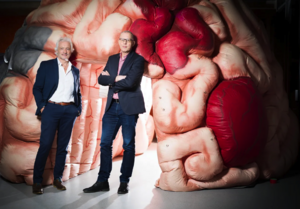
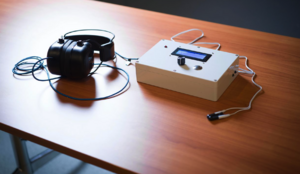

 Member
Member
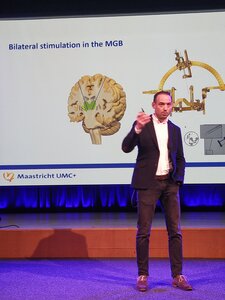
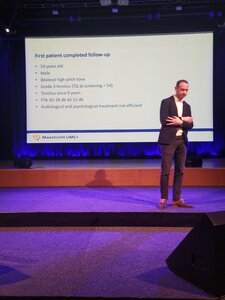
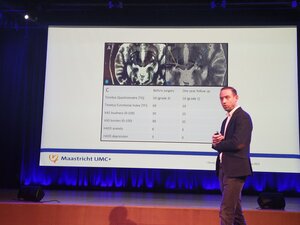
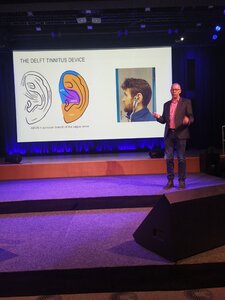
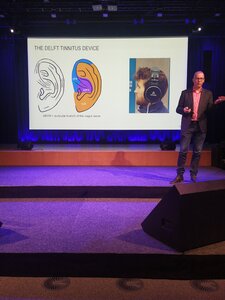
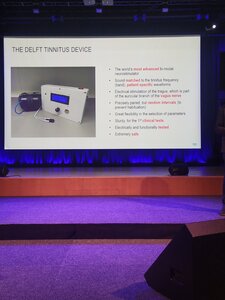
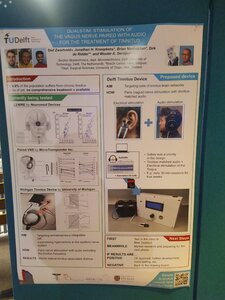
 I can also imagine that it might seem like I'm trying to defend Dr. De Ridder or cover for him; that's not the case. I also value intellectual honesty, especially in the field of tinnitus research. And I, too, have my concerns about some of his work and theories. However, if we were to erase even the recent research performed by researchers like Dr. De Ridder, Dr. Rauschecker, or Dr. Tzounopoulos, would we have a better understanding of how tinnitus manifests in the brain?
I can also imagine that it might seem like I'm trying to defend Dr. De Ridder or cover for him; that's not the case. I also value intellectual honesty, especially in the field of tinnitus research. And I, too, have my concerns about some of his work and theories. However, if we were to erase even the recent research performed by researchers like Dr. De Ridder, Dr. Rauschecker, or Dr. Tzounopoulos, would we have a better understanding of how tinnitus manifests in the brain?
